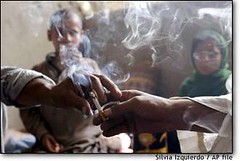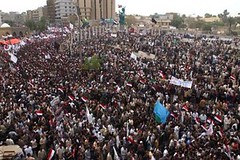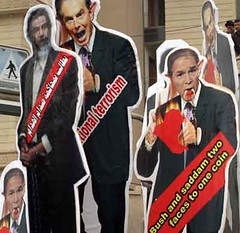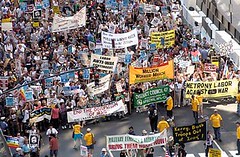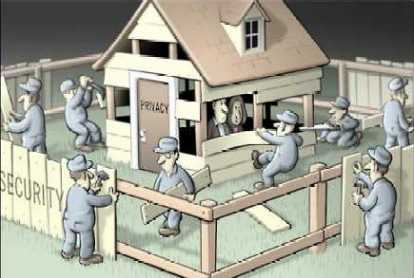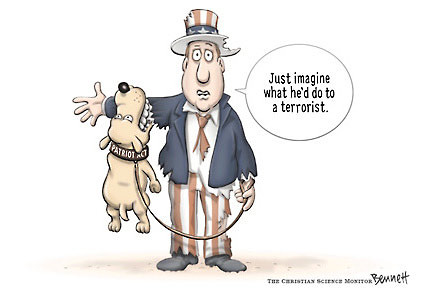Humanity Unite!
Thanks to
budjesmuhyawkar for this
Thomas Merton quote:
At this point I am making a public renunciation, in my own name at least, of all tactical, clerical, apologetic designs upon the sincerity of your unbelief. . . I think this apology is demanded by the respect I have for my own faith. If I, as a Christian, believe that my first duty is to love and respect my fellow in his [or her] personal frailty and perplexity, in his [or her] own unique hazard and need for trust, then I think that the refusal to let him [or her] alone, to entrust him [or her] to God and [their] conscience, and the insistence on rejecting them as persons until they agree with me, is simply a sign that my own faith is inadequate.
My own peculiar task in my Church and in my world has been that of the solitary explorer who, instead of jumping on all the latest bandwagons at once, is bound to search the existential depths of faith in its silences, its ambiguities, and in those certainties which lie deeper than the bottom of anxiety. In these depths there are no easy answers, no pat solutions to anything. It is a kind of submarine life in which faith sometimes mysteriously takes on the aspect of doubt, when, in fact, one has to doubt and reject conventional and superstitious surrogates that have taken the place of faith. On this level, the division between believer and unbelievers ceases to be so crystal clear. It is not that some are all right and others all wrong: all are bound to seek in honest perplexity. Everybody is an unbelievers more or less
This quote sums up not only the importance of human unity in the face of divisive dogma, but the religious imperative to delve below the surface of personal faith. Religious belief and practice are based on faith, something that by its very nature cannot be factually proved or
disproved. Though differing admittedly by degree, we as human possess a distinct rational sense that will vacillate that faith. The myth of "factual objectivity" attempts to undermine the very premises of constant faith, forcing reason into a staunch stance against faith. Faith and reason can and must coexist if we are to accept the common human condition, much less our personal experiences. What is reason but a faith in "factual objectivity"? What is science, but a faith in reasonable conclusions? Acceptance, not denial is an important tenant in every major belief system, including Christianity.
Without the counterpart to an entity, that entity does not exist. Without dark, there is no light. Without evil, there is no good. Without both dichotomies, there is no choice, no challenge to explore ... no faith. Without some doubt, there can be no true understanding of faith, just as without dutiful practice, there is no religion. Part of accepting the unity of concepts is understanding its duality. Part of embracing monotheism is understanding there is one God who created with one hand, good and the other, evil. This is difficult to accept, but in true faith, this duality must be digested and dissolved. Acceptance is not the easiest road to walk, but if religion was so easy to practice, what would differentiate the believers from the non-believers?
Merton's answer: not much. By embracing the doubt that plagues our faith, we embrace the uncertainty of the non-believer. True faith is not certainty, but an uncertain belief that stands on its own without any factual insurance or political funding. It is alone. Someone that does not doubt his/her own faith does not understand the true nature of faith. Fellowship and empathy is no substitute for understanding. Without understanding and accepting our own inner self, how can we understand others and accept them for who they are?
Thomas Merton many times commented on the misled acceptance of our "outer inner self", the inner window to what others believe us to be. We too often internalize what others perceive of us and create a stranger within that we mistake for ourselves. Without constant, silent reflection, we are doomed to become this pale shade of ourselves, doomed to living as someone we are not and thus embrace others in the same way. There is no struggle. There is no understanding.
We are blind mouths consuming all, digesting nothing.
Even the non-believer knows this, for the non-believer is
no different than the believer. To become a non-believer, one must reject a belief. To reject a belief, one must attempt to understand and consume it, choosing only afterward the pieces that cannot be digested. The creative energy comes into play when that believer melds the remaining fragments together into a coherent structure, wobbly at first, but bound to gain stability over time.
Merton is right to embrace his connection with the non-believer, for all true believers are also non-believers. We can all argue the role or absence of the Creator, but there is no denying the creation. Is it the timeline of creation we really care about or the meaning of it now that we are in it? The path to this understanding seems inescapable:
The glue of creation binds together all things, whether we wish to be apart of it or not.
Oklahoma City - April 19, 1995
Today is the anniversary of the Oklahoma City bombing that killed over 168 people including many children. As much as we might wish to ignore the right-wing conspiracies that created the militia movement, we owe it to ourselves and the next generation to re-learn the lesson taught during that time.
US radical right remains a threatBy Kevin Anderson
BBC News The Oklahoma City bombing shocked the United States in 1995 and brought to light the shadowy world of radical rightwing paramilitary groups known as militias. Militia members considered themselves a citizens' defence force against a government tilting towards tyranny and a sinister global conspiracy. Timothy McVeigh and co-conspirator Terry Nichols had attended militia meetings, hoping to find allies in the anti-government paramilitaries, but they were never members.
However, following the bombing, the media and law enforcement suddenly focused on the armed and virulently anti-government subculture of the militias. Ten years on, militias are just a shadow of what they were at their height in the mid-1990s but experts and law enforcement say that while the militias may have waned, the radical rightwing movements that spawned them have not.
The riseExact numbers are difficult to come by but at their peak in 1995 and 1996, militias were estimated to have some 25,000 members and a larger number of sympathisers, Mark Pitcavage, who tracks extreme rightwing groups for the Anti-Defamation League, told the BBC News website.
From their peak in late 1996, today membership in the militias is only a few thousand, he said. The radical right in the US has always had a fascination with paramilitary organisations dating back to the secretive, anti-communist Minutemen in the 1960s, Michael Barkun, a professor of political science at Syracuse University, told the BBC News website.
But beginning in the 1980s, so-called new world order conspiracy theories spread throughout the extreme right in the US, he said. "They asserted some nebulous conspiracy was on the threshold of seizing all power in the US and dismantling the constitutional system," Mr Barkun added. It is not that the extreme right has ceased to exist or that the potential for violence has disappeared.
The fear of a globalist, socialist tyrannical conspiracy became an article of faith in the radical right, according to Mr Pitcavage. And militias sprang up to face what they saw was an imminent threat, with sightings of ominous black helicopters and reports of foreign forces in the US on secretive manoeuvres. The conspiratorial speculation reached a fever pitch with an unwitting reference by former President Bush to a "new world order" in a 1991 speech to Congress marking the end of the Gulf War.
Mr Bush was simply noting the shift in geo-politics as the Soviet Union crumbled and suddenly the bi-polar world of the Cold War melted away, potentially giving rise to a new international strategic alignment. But the militias took this as a brazen confirmation of their worst fears by no less than the former head of the CIA, a member of the secretive Skull and Bones society, and now president of the United States. Their suspicions were reinforced with anger at the election of Bill Clinton, the passage of the assault weapons ban in the US and the ratification of the North American Free Trade Agreement.
And what drove Timothy McVeigh and others over the edge was the government raid at Ruby Ridge Idaho in 1992 and a standoff between the FBI and the Branch Davidians outside Waco, Texas, ended in tragedy on 19 April 1993 with the death of more than 80 men, women and children. McVeigh bombed the Murrah Federal Building in Oklahoma to mark the anniversary of the government raid in Waco.
The fallThe rise of the militia movement happened without the awareness of most Americans.
The Oklahoma bomb killed 168 people including children and infants
And actually, even the militias were not keen to have Timothy McVeigh around.
"They saw him as not controllable, as an unguided missile," Mr Barkun said, adding: "Clearly, he saw himself as a member of this kind of militantly anti-government subculture."
But suddenly with this greatest act of domestic terrorism on American soil - until 11 September 2001 - these radical rightwing paramilitary groups were thrust into the media spotlight.
Law enforcement also took a keen interest in the militias and increased their surveillance of the groups. Law enforcement reached out to those in the militias that it could, telling them they could carry on as long as they did not break the law and asked if they did hear of anything illegal or potentially violent to let them know, Mr Barkun said.
The extreme right is never terribly organised, he said, and the bombing caused further fractures. Some militia leaders tried to enter mainstream politics while others became even more extreme, dropped out of the militias and went underground. The militias' conspiracy theories also included Y2K. They thought the shadowy forces of the conspiracy would use the mass computer failure predicted by some to declare martial law. Some militia members sold everything they had, bought a year's supply of dried food and enough weapons for a small army and prepared for Armageddon.
When 1 January 2000 dawned bright and shiny and everyone's computers still worked apart from a few slot machines in New Jersey and some trains in Sweden, more militia members abandoned the movement. But the decline in the militias should not be read as an overall decline in the radical right in the US, experts are quick to add.
Mr Barkun said: "It is not that the extreme right has ceased to exist or that the potential for violence has disappeared." The militias were fashionable for a brief period, and they will doubtless be replaced by something else, although it is not clear what that might be or who would be the leader. Major leaders of the radical right are either in jail as is the case with white supremacist Matt Hale or dead as in the case of National Alliance leader William Pierce.
Mr Pitcavage saw a slight increase in militia activity as of late with increased activity on message boards on the internet.
But they have learned the lessons of the 1990s, he added.
They are much less public about their activities and some have tried to recast themselves as supporting homeland security efforts in the wake of the 11 September 2001 attacks.
Onward Christian Judges
After
my previous post about the non-separation of Church and State in our executive branch, I am sickened to read more about the lack of separation in our national legislature. Moreover, the Senate attempting to spread this "Faith-based Federalism" into the judiciary. According to the New York Times, Senator Majority Leader Bill Frist,
my favorite physician turned politician, is slated to attend "Justice Sunday" in Kentucky to slander yet again those "godless liberals":
As the Senate heads toward a showdown over the rules governing judicial confirmations, Senator Bill Frist, the majority leader, has agreed to join a handful of prominent Christian conservatives in a telecast portraying Democrats as "against people of faith" for blocking President Bush's nominees.
Fliers for the telecast, organized by the Family Research Council and scheduled to originate at a Kentucky megachurch the evening of April 24, call the day "Justice Sunday" and depict a young man holding a Bible in one hand and a gavel in the other. The flier does not name participants, but under the heading "the filibuster against people of faith," it reads: "The filibuster was once abused to protect racial bias, and it is now being used against people of faith."
To an outside observer of all this, it is tempting to come only to one conclusion: these judges are evangelical Republicans with radical ideologies isolated from the status quo. This may not be the case, but Frist is destroying any legitimacy his Republican colleagues had by attending this event.
If on trial, I think most Americans (and probably everyone in the world) would want a fair judge, not necessarily a "Christian" judge. Especially since "Dominion Christians" have
hijacked the Bible and used it as a stone to cast at everyone but themselves. I think the last thing I want is one of those judges deciding my fate, but groups like
Family Research Council hypocritically believe that the law is applied only against others, not themselves. They are the Righteous and you and I are the "criminals". In a phrase, they want to become the new Pharisees, the new Pharoahs, with rest of the country becoming their slaves.
This whole filibuster issue is ludicrous. Republicans have claimed that such a drastic step as the "nuclear option" is necessary because Democrats are impeding the process of appointing federal judges to the point that the federal judiciary now has a vacancy crisis. Actually, the vacancy rate is at its lowest in 14 years. How many judges have been filibustered? 10 out of 204 of Bush's nominees. I could go into more facts but I'll let
Moving Ideas argue that further.
I think I could argue the principle of Separation of Church and State until my fingers fall off. So, I'll end this with
Thomas Jefferson's observation, writing to the Danbury Baptist association in the state of Connecticut in 1802:
Believing with you that religion is a matter which lies solely between man & his god, that he owes account to none other for his faith or his worship, that the legitimate powers of government reach actions only, and not opinions, I contemplate with sovereign reverence that act of the whole American people which declared that their legislature should make no law respecting an establishment of religion, or prohibiting the free exercise thereof, thus building a wall of separation between church and state.
Congress thus inhibited from acts respecting religion, and the Executive authorised only to execute their acts, I have refrained from presenting even occasional performances of devotion presented indeed legally where an Executive is the legal head of a national church, but subject here, as religious exercises only to the voluntary regulations and discipline of each respective sect.
Adhering to this expression of the supreme will of the nation in behalf of the rights of conscience, I shall see with sincere satisfaction the progress of those sentiments which tend to restore to man all his natural rights, convinced he has no natural right in opposition to his social duties.
Thanks, Tom. We needed that.
Bombs aren't Nutritious?
The more we hear about emerging democracy in Iraq, another roadside or pipeline bomb is reported. We all know about the chaos in Iraq right now, but what about the innocents who have been beaten down by Paul Bremer and his coalition authority policies? There is enormous focus on security, but the question arises, "What are we securing if the people are still suffering?"
If there's no peace, what are coalition forces fighting for? If people are hungry, unemployed, and missing basic necessities, then how long can democracy last even with current coalition troops there?
The following article clearly articulates the lunacy of current Iraq policy as only the Monty Python crew can. Let them eat bombs
The doubling of child malnutrition in Iraq is baffling
A report to the UN human rights commission in Geneva has concluded that Iraqi children were actually better off under Saddam Hussein than they are now.
This, of course, comes as a bitter blow for all those of us who, like George Bush and Tony Blair, honestly believe that children thrive best when we drop bombs on them from a great height, destroy their cities and blow up hospitals, schools and power stations.
It now appears that, far from improving the quality of life for Iraqi youngsters, the US-led military assault on Iraq has inexplicably doubled the number of children under five suffering from malnutrition. Under Saddam, about 4% of children under five were going hungry, whereas by the end of last year almost 8% were suffering.
These results are even more disheartening for those of us in the Department of Making Things Better for Children in the Middle East By Military Force, since the previous attempts by Britain and America to improve the lot of Iraqi children also proved disappointing. For example, the policy of applying the most draconian sanctions in living memory totally failed to improve conditions. After they were imposed in 1990, the number of children under five who died increased by a factor of six. By 1995 something like half a million Iraqi children were dead as a result of our efforts to help them.
A year later, Madeleine Albright, then the US ambassador to the United Nations, tried to put a brave face on it. When a TV interviewer remarked that more children had died in Iraq through sanctions than were killed in Hiroshima, Mrs Albright famously replied: "We think the price is worth it."
But clearly George Bush didn't. So he hit on the idea of bombing them instead. And not just bombing, but capturing and torturing their fathers, humiliating their mothers, shooting at them from road blocks - but none of it seems to do any good. Iraqi children simply refuse to be better nourished, healthier and less inclined to die. It is truly baffling.
And this is why we at the department are appealing to you - the general public - for ideas. If you can think of any other military techniques that we have so far failed to apply to the children of Iraq, please let us know as a matter of urgency. We assure you that, under our present leadership, there is no limit to the amount of money we are prepared to invest in a military solution to the problems of Iraqi children.
In the UK there may now be 3.6 million children living below the poverty line, and 12.9 million in the US, with no prospect of either government finding any cash to change that. But surely this is a price worth paying, if it means that George Bush and Tony Blair can make any amount of money available for bombs, shells and bullets to improve the lives of Iraqi kids. You know it makes sense.
·Terry Jones is a film director, actor and Python. He is the author of Terry Jones's War on the War on Terror
www.terry-jones.net
Filling the Swamp
Many international policy experts agree that there is a real need to reduce terrorism at its source. Drain the swamp, and kill the mosquitoes,
they say. Even Rumsfeld
was quoted saying this in reference to the Bush Doctrine. It is very naive to assume that 9/11 was the only terrorist action against the US; it was only the most successful. The prevailing anti-US attitude across the Arab world and increasingly in Europe (as Muslim populations grow), abject poverty, and tyrannical foreign regimes help support healthy terrorist recruitment. These and even deeper root causes need to be addressed more constructively.
The concept is clear: end the pre-conditions of terrorism and you reduce and mitigate terrorism. The means to that end are the topics of debate. So what was the
president's answer to why the US was attacked?
They hate our freedoms: our freedom of religion, our freedom of speech, our freedom to vote and assemble and disagree with each other.
Not only does this create a naive and impossibly righteous foreign policy, it also frames the issues in the form of direct confrontation. There is no understanding or common ground we can have with terrorists, so thus the conflict is presented as
"us vs. them". There has to be more to the issue than that. The planning and resources used for 9/11 alone suggests a personal abhorrence that this does not explain. They don't "hate our freedoms"! They hate our public duplicity and destructive foreign policy!
"Idealism increases in direct proportion to one's distance from the problem."
As
David Wallechinsky puts it, these are the major reasons the Muslim/Arab world hate us:
- WE'RE CLUELESS - Despite out attempts at isolation and blind consumerism, we live in a interdependent global economy in which few things are actually made inside the US and most of what we buy support brutal and unpopular actions abroad. The US populace are worse than sheep, we are blind lemmings, spouting freedom and democracy while at the same time buying products from reckless and greedy corporations who violate that freedom and democracy across the world.
- SABRA AND CHATILA - In these two Lebonese refugee camps, over 800 civilians were massacred in 3 days while Israeli troops stationed there simply watched. Even though the US denounced the brutality, the constant monetary support of Israel regardless sends a mixed message at best. At worst, we are condoning their brutal actions.
- THE GULF WAR I - We all know why this happened. Oil. Sure, you can put all of the spin you want on this one, but I guarantee if oil wasn't involved, we wouldn't have been there. As a matter of fact, Kuwaitees were not known for their kindness in the region, and since then the US compounded its hypocrisy.
- SUPPORT FOR REPRESSIVE DICTATORSHIPS - Come on, we supported Saddam, the Taliban, and Kuwait before this "high and mighty" freedom talk began. Not only did we support these regimes, we actually in some cases, created them. In the fog of the Cold War, we stirred the pot and made the maelstrom we're in now.
So what is happening now?
Increased terrorist activity using the opium trade as revenue in Afghanistan
Protests in Iraq over coalition occupation and policies
Protests in the US over the US Patriot Act and the Iraq War
Somehow, I don't feel any safer than I did before. Instead of "draining the swamp", we seem to be filling it, ushering in a new era of imperialism and anti-American sentiment.
UPDATE 4/14/2005:
There seems to be more reasons behind the current American imperialism. China is currently setting up military bases along its path to the Middle East exemplifying a "string of pearls" strategy. The obvious goal is to create a "petroleum road" from China into the Middle East. More about this from the Washington Post's Edward Cody.
UPDATE 4/28/2005:
World Terror Attacks Tripled in 2004 by U.S. Count according to the Washington Post:The number of "significant" international terrorist attacks rose to about 650 last year from about 175 in 2003, according to congressional aides briefed on the numbers by State Department and intelligence officials on Monday.
How Patriotic is the Patriot Act?
Then...
It was after the tragic events of 9/11. As the
9/11 Commission documented so well, terrorist threats were on a steady course to some cataclysmic action, but each administration was unwilling to confront these threats, preferring rather to selectively ignore them. People were saddened, scared and outraged that this kind of thing occurred in the US right under the government's nose. The government had to do something. John Ashcroft had that something in the Patriot Act.
Now...On December 31, 2005,
certain articles in the
US Patriot Act of 2001 will expire under a "sunset clause" attached to the Act in the Senate. Since that time is quickly approaching, Congress will now be forced into a debate that should have happened almost four years ago. The US Patriot Act (cleverly renamed from the blase "US Anti-Terrorism Act of 2001") was passed
with no debate and little opposition (almost unanimous) and has been in effect since October 2001 with little congressional oversight. So, it is not altogether shocking that now the entire act is open to questions.
In researching for this blog entry, I found no lack of opinions on the US Patriot Act and shouldn't have been surprised at the blinded partisan pundits on both sides. Those
left of the aisle view the Patriot Act as the death knell to civil liberties and an ushering in of a "Big Brother" state. The
right-wingers, particularly the war-hawks and pro-death groups, view the Patriot Act as a much needed hard-line, zero tolerance approach to dealing with terrorists, content the Act will only affect terrorism and presumably patriotism.
As usual, they are both wrong.
Rather than feed to my readers a pre-manufactured opinion courtesy of the DNC or the GOP, I offer my own homemade interpretation of the Patriot Act.
- Name:
I hate the name "US Patriot Act". This has nothing to with the football team, missile or a law-abiding citizen (hopefully). This has to do with terrorism and extending existing laws to give law enforcement better tools to detect domestic terrorists. The initial name of the Patriot Act was "US Anti-Terrorism Act of 2001". But the name change was definitely political, rallying the conservatives and outraging the liberals. Even Republicans commented on how impossible it was to explain to constituents they had voted against a bill called the "US Patriot Act"!
Also, the US Patriot Act defines domestic terrorism very broadly. Possibly puling many minor crimes and small grassroots organization into the definition, according to the ACLU's December 2002 article.
- Civil Liberties:
Most of the act is focused on adding terrorist crimes to existing laws and updating current statutes. For example, adding terrorism to the list of valid warrant evidences and upgrading warrant collection to include voice-mail with e-mail. Very minor changes at all. Other parts of the act reduce or change existing procedures. Such as reducing the proof and process of obtaining "sneak and peak" warrants (no one is notified of the warrant or what was gathered except the issuing judge and federal authorities) and allowing pen tapping (electronic and voice interception) without any proof on foreign non-citizens within/outside the US. There is very explicit language that forbids this kind of tap on US citizens. The Patriot Act (Section 223) even provides the ability for any target to sue the government if the information gained was improperly handled or acquired.
What is absent is the kind of judicial or legislative jurisprudence that usually accompanies bills of this magnitude. It is not to say that it doesn't document areas of congressional and judicial oversight; the bill simply does not document any new operational standards short of previous legislation which limited much more restrictive executive powers. The heavy reliance on grand jury hearings in foreign intelligence investigations creates a dangerous clandestine nature to warrants and arrests. This grand jury can replace many other courts' jurisdictions without the need to be transparent or possess any oversight. These issues primarily frighten many civil libertarian groups.
- Terrorist Funding:
The Patriot Act discards many banks' lax account handling policies, holding them liable for any funds laundered through them. It also expands the net of banks who face prosecution to include multinational banks (who had been somewhat exempt) located outside the US, but doing business in the US.
- Needed Legislation:
Only one terrorist was unsuccessfully prosecuted under the Patriot Act. What is surprising is how often many areas of the Patriot Act are being used by law enforcement for non-terrorist related crimes. What also is hard to gauge is whether the Patriot Act's powers are really used to stop terrorist crimes before they occur as the Justice Department claims. Also, many broad authority increases are not accompanied by important restrictions that usually accompany such legislation.
Conclusion:
The Patriot Act is a mixed bag. It is definitely not the precision tool for anti-terrorism that some claim, nor is it the apocalypse of civil liberties that others claim. I think it is fair that there are some over-reaching powers that need clarifying and some which might require exclusion. The Patriot Act is not perfect. Obviously, there should be better requirements for congressional and judicial oversight as well built into the law.
One such recommended amendment to the Patriot Act is the Safe Act. It basically extends the sunset provisions of the Patriot Act to include controversial articles and adds important restrictions to other articles. I support the Safe Act myself, seeing this as a valuable compromise between the warring factions.
Supporting the Troops
Support our US Troops; bring them home
now! Whether you were for the war or against it, the way the US has handled the occupation makes my stomach clench (see Harper's Weekly for the
Baghdad Ground Zero neocon plan and Voices in the Wilderness for the
continued Falluja siege). The continued insurgency is not simply made up of Saddam loyalists or multinational terrorists. Many of the insurgents are unemployed, hungry, and homeless results of Paul Bremer and Coalition Authority policies.
If the US wants Syrian troops out of Lebanon before the May election is considered
fair, then why have US troops overstayed their welcome in Iraq even
after the elections?
The following picture circulating among the US military puts it best:
Faith in Federalism
George W. Bush started his flirtation with faith well before his running for President in 2000. Perhaps the evangelical conservatives saw their opportunity even then to break down the wall between Church and State, but by any measurement, Bush has blown away all previous estimates. Is there anything sacred that the State does not lay claim to? Some call George Bush a "messiah in his own mind." All I know is he is not mine.
First, Bush decided that corporate and Christian interests were about the same: less secular governance. How do you reduce both the government hand-out programs and erode federal secularism? A stroke of genius: create the
Office of Faith-Based and Community Initiatives. Though there is some question on whether "faith" means anything but "Christian Faith" and "community" means anything but "Christian Community", Bush successfully renewed his small Texas state program into a monolithic federal agency.
Then, came the 9/11 response. Who can forget before all of the careful scripting in his rhetoric, what emerged from George's lips?
"This crusade, this war on terrorism is going to take a while."
Later, Bush would retract this, claiming that he "misspoke" and compensated by adding language to his speech on September 22, 2001 suggesting his "War on Terror" is not a "War on Islam." Knowing the twisted idealogies of this "born-again" evangelical, I understand what a huge
blunder this was. Unfortunately, the damage was done and terrorist recruitment grows daily.
Now, after winning re-election, Bush has no issue with officially endorsing
Christian movie reviewers, or issuing
presidential proclamations for religious pontiffs. Bush will now become the first president of the US to attend a pope's funeral. Although the pope is technically a leader of an officially recognized state Vatican City, I doubt it is in this secular capacity that Bush wants the media coverage at John Paul II's funeral.
As a Christian American, I am outraged by this false messiah in the Oval Office. The early American immigrants came here to escape state-sponsored religion, and the Founders explicitly built into the constitution checks against promotion or cessation of religious practices by the US Government. Religion is a choice, not a government mandate! And any Christian who believes a citizen of a decent country shouldn't be able to choose his/her own way is not a Christian!
Jesus was no bully. Last I looked, we are all sinners and he died to save us all.
UPDATE: For more detailed a debate about this, read Bill Moyer's
detailed synopsis in The NY Review.
Weapons of Mass Deception
Yesterday, the president-appointed "Commission on the Intelligence Capabilities of the United States Regarding Weapons of Mass Destruction" released what I presume to be its first and last
study on the faulty intelligence used to justify the Iraq invasion. The report was very blunt, stating the following:
The intelligence community was dead wrong in almost all of its pre-war judgments about Iraq's weapons of mass destruction. [...] The bad news is that we still know disturbingly little about the weapons programs and even less about the intentions of many of our most dangerous adversaries.
Now, to some, this might be news. But to me, I can't help but feel this is just another smokescreen to protect the administration. This is just another situation where no one among the president's advisors wants to take the fall for the rash, unjustified behavior that led us to war. Why isn't the media pointing out the obvious hypocrisy here? The president's advisors have admitted that they had planned to attack Iraq at least one year before 9/11 and pushed for Iraq before the logical target of Afghanistan immediately after 9/11 (read the condensed Plan of Attack Woodward's book) . So, who cares about the intelligence? The administration was in the process of planning the Iraq invasion long before the intelligence was there.
But to add insult to injury, Bush had to get his pictures with the commission, congratulate them and make an insipid speech that boiled down to this (paraphrasing):
See! See! It wasn't my administration's fault! These guys over here prove it. Now let's get these bad intelligence boys in line. The president and pentagon should control the flow of intelligence, not some independent agencies. The president should be the filter for intelligence, not intelligent professionals!
And that is the problem with this whole thing. Though the intelligence agencies are need of serious reform, if the administration had not pushed so hard for justifying a war they had already decided to prosecute, I have little doubt better intelligence would come through the proper channels. But hey, that's why Rummy has his own intelligence agency: he tells them what he wants to hear and they rubberstamp it!
Is there any individuality or independence left in our government?

